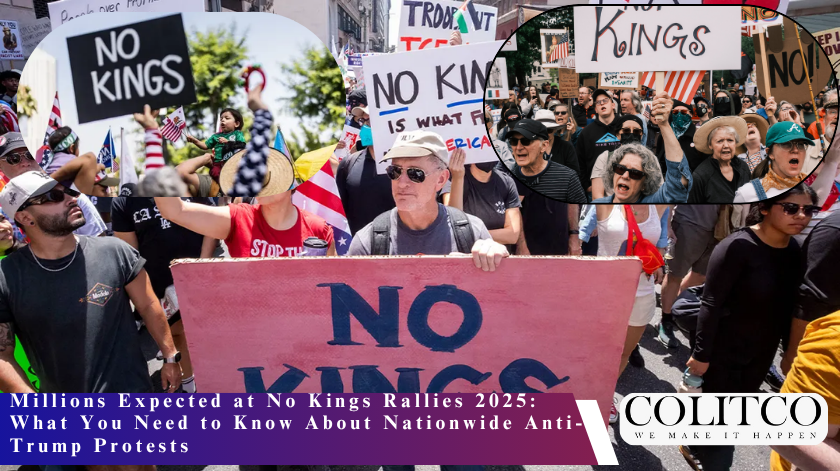Protesters across America are preparing for what could become the largest single-day demonstration in US history. On Saturday, millions of people will take to the streets for the second round of “No Kings” rallies, with over 2,700 events planned nationwide.
The protests come at a pivotal moment. The federal government shutdown has stretched into its third week. National Guard troops patrol Democratic-led cities. Immigration crackdowns intensify daily.
Republicans have labelled the demonstrations “hate America rallies.” Organizers call them a defence of democracy itself.
Where Are No Kings Rallies Taking Place?
The No Kings protest schedule for 2025 spans every corner of the nation. Events are planned in all 50 states, several US territories, and even internationally in countries like Canada, England, Germany, Ireland, and Spain.
Major city rallies include:
- Washington DC – National Mall, 12pm-3pm (100,000+ expected)
- New York City – Multiple locations starting 11am
- Chicago – Commons park near US Bank Stadium, 1pm
- Los Angeles – Downtown area, 2pm
- San Francisco – Market Street march, 2-3:30pm
- Boston – Boston Common with Mayor Michelle Wu speaking
- Philadelphia – City Hall and surrounding areas
- Denver – Colorado State Capitol, featuring live music and speakers
- Houston – Discovery Green, City Hall, and 10+ suburban locations
Finding No Kings rallies locations near you is simple. The official nokings.org website maintains an interactive map showing all registered events. Most Americans live within an hour’s drive of at least one demonstration.
Small towns are joining major cities. Burns, Oregon (population 2,700) and Bryson City, North Carolina (1,500 residents) both have events scheduled. This geographic spread reflects the movement’s grassroots nature.
HAPPENING NOW: No Kings Day is officially underway! Hundreds have gathered outside the US embassy in London for a protest against the fascist Trump regime (Video: bruceh2299) pic.twitter.com/GDZjBVfMVy
— Marco Foster (@MarcoFoster_) October 18, 2025
What Is No Kings Protest Movement About?
The No Kings protests emerged in response to what organizers describe as President Donald Trump’s authoritarian actions. The name references America’s founding principle: the nation has no kings, no monarchs, no absolute rulers.
“The president thinks his rule is absolute,” organizers state on their website. “But in America, we don’t have kings and we won’t back down against chaos, corruption, and cruelty.”
The coalition behind these rallies includes over 200 organizations:
- American Civil Liberties Union (ACLU)
- American Federation of Teachers
- Human Rights Campaign
- Indivisible
- MoveOn
- Sierra Club
- Veterans for Peace
- 50501 Movement
Their grievances span multiple policy areas. Immigration enforcement without warrants. Military deployments to American cities. The ongoing government shutdown. Healthcare cuts. Voting rights restrictions. Environmental rollbacks.
“We’re seeing the Trump administration target immigrant families, profile and detain people without warrants, threaten to overtake elections, and gut healthcare when families need it most,” the organizers’ statement reads.
This isn’t the first time Americans have mobilized against Trump administration policies. Earlier this year, “Good Trouble” protests marked John Lewis’s anniversary with over 1,500 events. The first No Kings demonstration in June drew an estimated 5 million participants.
At the last No Kings Day events across America, an estimated total of 5 MILLION Americans participated in our POWERFUL, non-violent protest. Even MORE are expected this year.
REMEMBER: It’s the non-violence that gives us the power. PASS IT ON. 🙏💪pic.twitter.com/LTardtBBeA
— BrooklynDad_Defiant!☮️ (@mmpadellan) October 18, 2025
June Protests Set the Stage
The inaugural No Kings Day took place on June 14, 2025. That date coincided with Trump’s 79th birthday and the US Army’s 250th anniversary military parade in Washington DC.
The turnout shocked observers. Between 4 and 6 million people participated across more than 2,100 locations nationwide. In Denver alone, 5,000 people gathered at the Colorado State Capitol. Monterey, California, saw over 6,000 protesters.
The June rallies demonstrated something significant. Despite fears of declining engagement, Americans were ready to mobilize in massive numbers when they felt democracy was threatened.
Saturday’s events are expected to surpass those figures. As of Friday, organisers reported 2,700+ registered locations compared to 2,100 in June. Ezra Levin, a lead organizer, told reporters they’re anticipating “the largest protest in modern American history.”
Republican Response: “Hate America Rallies”
House Speaker Mike Johnson has become the most vocal Republican critic of the protests. He’s repeatedly referred to them as “hate America rallies” and claimed without evidence that pro-Hamas supporters and “Antifa types” will dominate attendance.
“Let’s see who shows up for that,” Johnson told Fox News. “I bet you see pro-Hamas supporters. I bet you see Antifa types. I bet you see the Marxists in full display.“
Johnson has also blamed the protests for prolonging the government shutdown. He suggests Democrats are catering to “radical groups” organizing the demonstrations rather than working to reopen the government.
Senate Republicans echoed this messaging. In an October 7 X post, they wrote: “Senate Democrats refuse to reopen the government before their radical base descends on DC.”
Independent Vermont Senator Bernie Sanders fired back on X: “No, Speaker Johnson: The No Kings Rally on October 18 is not a ‘hate America’ rally. Quite the contrary. It’s a rally of millions of people who believe in American freedom.”
The White House dismissed the protests entirely. Spokesperson Abigail Jackson told reporters: “Who cares?“
This political tension mirrors earlier confrontations between Trump and Democratic governors over National Guard deployments and protest responses.
Safety Measures and Security Concerns
Organizers have emphasized their commitment to nonviolent protest. All event hosts must complete mandatory safety and de-escalation training. Safety marshals will be present at demonstrations.
“A core principle behind all No Kings events is a commitment to nonviolent action,” official statements read. “We expect all participants to seek to de-escalate any potential confrontation with those who disagree with our values.”
The Department of Homeland Security issued warnings about potential violence. In an intelligence report obtained by CNN, DHS said it’s “concerned” about demonstrations based on behavioral indicators observed at 2025 events.
However, DHS did not identify specific, credible threats. The report was meant to make law enforcement aware of indicators and mitigation strategies.
Law enforcement agencies are actively monitoring social media and working with local organizers. In major cities like Washington DC, Chicago, and New York, police departments have developed coordination plans.
Some participants express concerns about potential clashes. The polarized political environment and aggressive rhetoric from both sides create tension. But veteran organizers stress their track record of peaceful demonstrations.
“There will be no fear, but the fear of what will happen to us if we don’t mobilize,” said Byron Sigcho-Lopez, alderperson of Chicago’s 25th Ward.
What Protesters Are Fighting Against
The specific grievances driving Saturday’s turnout reflect accumulated frustrations over nine months of Trump’s second term.
Immigration enforcement tops many protesters’ concerns. ICE raids continue without warrants. Families face separation. International students who participated in campus protests have been detained and face deportation.
“They are targeting immigrant families, profiling, arresting and detaining people without warrants,” organizers state.
Government shutdown enters its third week with no resolution in sight. Federal workers face furloughs. Essential services hang in limbo. House Democrats accuse Republicans of creating chaos while blaming protesters.
National Guard deployment to Democratic-led cities remains controversial. Troops patrol streets in Los Angeles, Chicago, and other urban areas despite local officials saying they never requested military support. The militarization of domestic law enforcement troubles civil liberties advocates.
Healthcare cuts threaten millions. Protesters fear Trump administration proposals will gut Medicaid and Medicare coverage for vulnerable populations.
Voting rights restrictions concern democracy advocates. They point to efforts at gerrymandering and limiting ballot access.
Environmental rollbacks worry climate activists as regulations get dismantled.
These aren’t abstract policy debates. Real people face real consequences. A Houston organizer explained: “We’re not against a party. We’re against regression.”
Already thousands and thousands of people are out in Chattanooga, Tennessee for the peaceful NO KINGS protest in this red state.
America is tired of Trump! #NoKings pic.twitter.com/5aXHMkoDWZ
— Ed Krassenstein (@EdKrassen) October 18, 2025
Celebrity Support and Political Backing
High-profile figures have pledged to attend or support the rallies. Celebrities including Jane Fonda, Kerry Washington, John Legend, Alan Cumming, and John Leguizamo plan to participate in events.
Progressive political leaders are amplifying the message. Senator Bernie Sanders defended the protests against Republican attacks. House Democratic Leader Hakeem Jeffries, while uncommitted to attending, pushed back on the “hate America” characterization.
“These are everyday Americans coming together,” said activist Kimberly Parker. “Faith leaders, teachers, veterans, small business owners being impacted by dubious tariffs. People seeing friends and family kidnapped off the streets.”
Boston Mayor Michelle Wu will headline her city’s rally on the Common. Attorney General Keith Ellison will speak in Minneapolis alongside Minnesota AFL-CIO President Bernie Burnham.
The diverse speaker lineups reflect organizers’ strategy. They want to show this movement transcends traditional activist circles and represents mainstream Americans.
What Happens Next
Saturday’s protests mark a moment, not a conclusion. Organizers view them as part of sustained resistance to what they see as authoritarian overreach.
The immediate impact remains to be seen. Will massive turnout pressure Republicans to negotiate on the government shutdown? Will Democrats find renewed courage to oppose administration policies?
Longer-term, the No Kings movement aims to build grassroots infrastructure. They’re connecting people to local organizing, voter registration drives, and issue-specific campaigns.
“If you are cynical, you might not understand the utility of simply standing together,” said Lisa Gilbert, co-president of Public Citizen. She encourages participants to take one action they’ve never done before, call senators, attend a town hall, or join a local group.
Harvard sociologist Liz McKenna notes that mass movements have historically driven social change. But their effectiveness has declined since 2000. The question becomes whether No Kings can buck that trend.
“We are not even a year into the Trump administration,” McKenna said. “The strategy is to show ‘we’re not backing down.”
Also Read: School Bullying Reforms Australia: What’s Changing In 2025?
The Bigger Picture
These protests unfold against a backdrop of deepening political polarization. Trump’s “Big Beautiful Bill” faces criticism for adding $2.4 trillion to the national debt. His foreign aid cancellations using rare budget procedures spark legal challenges.
Meanwhile, disruptions in Congress highlight institutional breakdown. Basic governance has become nearly impossible amid fierce partisan warfare.
For protesters, Saturday represents a choice. Accept what they see as democratic erosion, or stand up peacefully for the America they believe in.
“In June, we did what many claimed was impossible,” organizers wrote. “We peacefully mobilized millions to declare with one voice: America has No Kings. And it mattered.”
Whether Saturday’s demonstrations achieve similar impact depends on turnout, media coverage, and political responses in the days that follow.
One thing seems certain: millions of Americans remain willing to take to the streets when they believe their country’s fundamental principles are at stake. That civic engagement itself may be the most important message of all.












